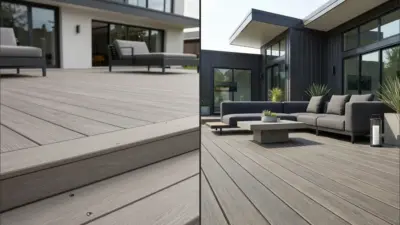Commercial doors play a crucial role in securing buildings, ensuring accessibility, and maintaining operational efficiency. Over time, regular use causes wear and tear, which can lead to costly repairs or replacements if not addressed.

Proper maintenance keeps door hardware functional, enhances security, and increases longevity. By following a structured maintenance plan, businesses can prevent unexpected failures and ensure smooth door operation.
#1: Conduct Routine Inspections
Regular inspections help identify potential issues before they escalate. A structured approach ensures all door components are checked and maintained in optimal condition.
Key Areas to Inspect
When performing routine inspections, focus on the following areas:
- Hinges and Screws: Check for loose or rusted screws that can cause misalignment.
- Locks and Latches: Ensure locks engage smoothly without jamming or stiffness.
- Door Frames: Inspect for warping, cracks, or gaps that may affect closure.
- Weather Stripping: Look for signs of wear that might let in moisture or drafts.
- Automatic Door Sensors: Test electronic components to verify they respond correctly.
Regular inspections should be conducted at least once a month, with thorough checks performed quarterly.
#2 – Clean and Lubricate Door Hardware
Dirt, dust, and grime accumulate over time, causing friction and reducing the efficiency of moving parts. Cleaning and lubrication are essential for maintaining functionality.
Proper Cleaning Techniques
- Use a mild detergent and water to clean door handles, locks, and hinges.
- Avoid abrasive cleaners that may damage metal finishes or corrode surfaces.
- Wipe down all components with a soft cloth to prevent scratching.
- Use a small brush to clean crevices and hard-to-reach areas where dirt accumulates.
Choosing the Right Lubricant
Lubrication ensures smooth movement and reduces friction, preventing unnecessary wear. Use the right type of lubricant for different components:
- Silicone-based lubricants for hinges and locks to prevent rust.
- Graphite powder for keyholes to avoid clogging.
- Teflon-based sprays for door closers and automatic mechanisms.
Applying lubrication every three to six months helps keep hardware in good working condition.
#3 – Tighten and Adjust Door Hardware
Loose components can cause misalignment, leading to doors that don’t close properly or require excessive force to operate. Checking and tightening hardware prevents premature failure.
Steps to Secure Door Components
- Use a screwdriver or wrench to tighten all screws and bolts.
- Inspect hinges for sagging and realign them if needed.
- Check the strike plate on the door frame to ensure the latch engages correctly.
- Replace missing or worn-out screws with high-quality replacements.
Regularly adjusting hardware helps prevent strain on components, reducing the risk of long-term damage.
#4 – Avoid Improper Door Use
Rough handling and improper usage contribute to the deterioration of commercial door hardware. Educating employees and visitors on proper door operation minimizes unnecessary strain.
Preventing Damage from Forceful Handling
- Do not slam doors—install door closers to control movement.
- Encourage smooth operation—turn handles and locks gently.
- Ensure doors open and close fully to prevent hinge misalignment.
Reducing Wear on Locks and Handles
Forcing a lock or applying too much pressure on handles can lead to mechanical failure. To avoid this:
- Clean keyholes regularly to prevent dirt from jamming locks.
- Use correct keys without excessive force.
- Replace handles that feel loose before they break completely.
#5 – Protect Door Hardware from Environmental Damage
Exposure to weather conditions and moisture can degrade door hardware. Taking preventive steps ensures durability and longevity.
Shielding Against Moisture and Rust
Humidity and water exposure accelerate corrosion. To protect metal components:
- Apply a rust-resistant coating to hinges and locks.
- Ensure proper weather stripping to prevent water intrusion.
- Dry door hardware after heavy rain or cleaning.
Keeping Dirt and Debris Away
Dust and debris inside keyholes, hinges, and automatic door tracks can cause operational issues. To minimize buildup:
- Vacuum door tracks regularly for sliding doors.
- Use dust covers on locks and keyholes when not in use.
- Wipe down hardware frequently to prevent dirt accumulation.
#6 – Repair and Replace Worn-Out Components
No matter how well-maintained a door is, some parts will eventually wear out. Addressing small issues early helps prevent costly repairs down the line. Relying on trusted suppliers of Commercial Door Hardware ensures access to high-quality replacement parts and expert support to keep your doors functioning efficiently and securely.
Signs That Hardware Needs Replacement
- Doors sticking or jamming despite lubrication.
- Locks becoming difficult to engage or showing visible rust.
- Hinges making loud noises even after tightening.
- Handles becoming loose or detaching.
Selecting Quality Replacement Parts
When replacing hardware, prioritize durability. Commercial metal doors require heavy-duty components built for frequent use. Consider:
- Stainless steel or brass for rust resistance.
- High-quality automatic door closers for smooth operation.
- ANSI/BHMA-certified locks for enhanced security.
Investing in quality replacements ensures longevity and reduces maintenance needs.
#7 – Schedule Professional Maintenance
While basic upkeep can be handled in-house, professional servicing is recommended for complex repairs and adjustments.
When to Seek Professional Help
- If a door frame is misaligned and requires reinstallation.
- When automatic doors malfunction due to sensor issues.
- If a lock mechanism becomes unreliable or needs rekeying.
- For periodic security audits to ensure all access points remain secure.
Professional maintenance helps identify hidden issues and ensures compliance with safety regulations.
First, What’s The Importance of Regular Door Maintenance?
Here are some of the benefits of regular door maintenance:
Preventing Security Risks
A malfunctioning commercial door compromises security. If locks fail or doors don’t close properly, unauthorized access becomes a risk. Regular maintenance ensures that locks function correctly, hinges are stable, and security systems remain intact. Incorporating reliable products like Schlage commercial door hardware can further enhance security measures.
Enhancing Safety
A poorly maintained door can become a safety hazard, leading to accidents or injuries. Loose handles, broken hinges, or misaligned frames may cause doors to slam shut unexpectedly or not open when needed. Ensuring all components are in good condition minimizes safety risks for employees and visitors.
Reducing Operational Disruptions
A commercial door that doesn’t function properly can slow down business operations. In facilities with high foot traffic, malfunctioning doors create bottlenecks and inconvenience customers. Proper maintenance helps avoid downtime and ensures smooth daily operations.
Conclusion

Maintaining commercial door hardware requires a proactive approach, including routine inspections, proper cleaning, lubrication, and timely repairs. Preventing damage from rough handling and environmental factors further extends the life of door components.
Regular upkeep enhances security, improves functionality, and minimizes unexpected repair costs. By implementing these best practices, businesses can ensure their doors operate efficiently for years to come.
- 1share
- Facebook0
- Pinterest1
- Twitter0
- Reddit0



